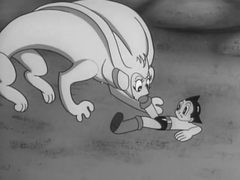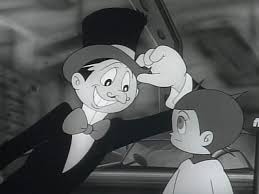PHENOMENALITY: *marvelous*
MYTHICITY: *fair*
FRYEAN MYTHOS: *comedy*
CAMPBELLIAN FUNCTION: *psychological*
I never followed the successful independent comic THE TICK. The few random issues I encountered didn't strike me as funny, so I gave it a pass. I mildly enjoyed the blue-hued crusader's ventures into television, a 1994 cartoon and a 2001 live-action teleseries. But the two-season Amazon Prime series seems a thing apart.
The first episode sets up the premise of the world of POV character Arthur Everest (Griffin Newman). Superheroes and supervillains have dominated Arthur's world for at least twenty-something years, beginning with the appearance of the Superman-like Superian and the Justice League-ish group The Flag Five. A supervillain, The Terror (Jackie Earle Haley), assassinates most of the Flag Five, as well as incidentally killing Arthur's father by landing a ship on top of the man, in full view of his son. However, after a subsequent encounter with Superian, everyone believes The Terror to be dead.
Except Arthur. He grows up to be a nervous accountant whose sister Dot thinks he's obsessed with a dead man, but Arthur becomes convinced that the Terror simply faked his death. He begins videotaping underworld gatherings, trying to gather evidence, only to have his life turned upside down by The Tick.
The Tick (Peter Serafinowicz) is a huge guy in a blue tick costume-- assuming that it is only a costume-- who possesses immense strength and near-invulnerability. What he doesn't possess is the slightest idea of who he is or where he came from. His memory begins with his meeting with Arthur, and because he witnesses Arthur "fighting crime" in his fashion, the rather buffoonish hero immediately decides the two of them should be partners. In a roundabout way, the thick-witted crusader bestows on the accountant a winged costume capable of sustained flight. But the costume's the property of a criminal gang with ties to The Terror, who is, surprise, surprise, really still alive.
Despite his reluctance, Arthur becomes drawn into the superhero world, even though The Tick is far from the ideal mentor. In addition to having no memory, The Tick utters nothing but superhero cliches and remains obtuse as to any other reason for existence. To be sure, he's not the only one. Crime-boss Ramses IV and the electrically-powered Miss Lint constantly vie for power prior to the Terror's re-appearance, but though they all know who they are, they're all less than perfect representatives of super-crime. Arthur and The Tick are obliged to accept the help of a former Flag Five member who has remodeled himself into a lethal Punisher-like vigilante, name of Overkill (Scott Speiser), but his all too human flaws make him less than a self-possessed master of ultraviolence.
Not everything in THE TICK is as funny as the combo of Arthur and his big blue buddy. I could have lived without Tinfoil Kevin, a street-person wearing the expected tinfoil hat, or Dangerboat, Overkill's sentient vehicle. But there's a joie de vivre to this superhero spoof that rarely shows up in this post-WATCHMEN era. When the first episode mentions how the Flag Five were slain thanks to "weaponized syphilis," one might suspect that the series plans to pursue the heavy dramatics of INVINCIBLE or the dark irony of THE BOYS. But in a much later episode, The Tick, despite having no memory, shows a resolute if naive moral compass, taking a dim view of Overkill's "take no prisoners" ethic. And when the blue buffoon gets the chance to forbid Overkill from killing any more, the show gets good comic value out of a murder-happy vigilante who can't indulge in gratuitous violence.
Best line in the season comes at the end, when The Terror's huge metal flight-ship (shaped like a "T") is assailed by the titular crimefighter, and Miss Lint gets to tell the Terror:
"You've got a Tick!"





















































